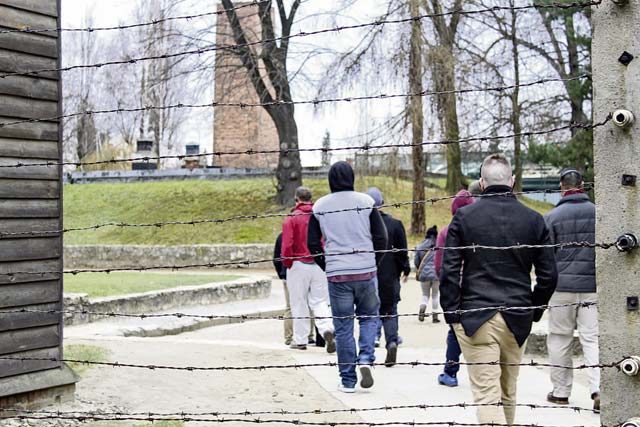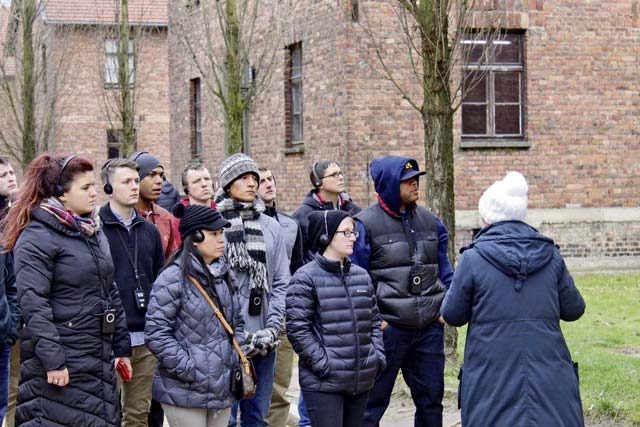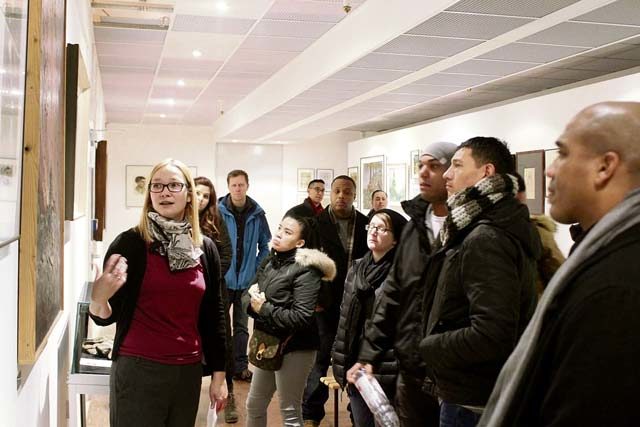
OŚWIĘCIM, Poland — The 16th Special Troops Battalion recently conducted a Staff Ride to Oswiecim, Poland, for all leaders at the platoon level and above. Oswiecim is probably known better by its German name during World War II, Auschwitz, and it was the location of an infamous Nazi death camp complex. While there, participants took part in guided tours, seminars, and visits to different museums dedicated to the Holocaust. The staff ride concluded with participants traveling to Nuremberg, Germany, to visit the courthouse museum where the major Nazi war criminals were tried by an international military tribunal shortly after the war. The staff ride served as the culminating event in a three-month leader professional development train-up for all participants. The innovative program sharpened leaders’ ethical and critical decision-making skills through a practical exercise that led them through the Army Regulation 15-6 investigation process on a World War II case study.
Prior to the actual staff ride, the unit leaders read “Ordinary Soldiers: A Study in Ethics, Law, and Leadership.” The West Point Center for Holocaust and Genocide Studies and United States Holocaust Memorial Museum created this case study, which documented the participation of a reserve German infantry battalion in genocide in Occupied Belarus in 1941.
In early October 1941, the battalion commander gave each of his three maneuver company commanders a single illegal order: “Kill all the Jews in your AO [area of operation].” One company commander complied immediately. The second company commander considered the order, and then rejected it. The third company commander sought to avoid carrying out the order at first, but once the battalion commander confirmed the order in writing, he directed the company’s first sergeant to conduct the executions.
The case study’s authors specifically created it for a military audience because it so clearly illustrates the ethical dilemmas confronting the company commanders in deciding whether to execute the order. These German soldiers were older reservists, serving in a new unit that had had no combat experience before taking up rear area security duties in Occupied Belarus. Their three company commanders each made very different decisions after receiving an illegal order, and shortly after the end of the Allied military occupation of Germany, the commander and first sergeant were tried and convicted in a Darmstadt court for their role in their company’s execution of the Jewish civilians. Importantly, the case study showed that despite facing harsh conditions of war and a radical Nazi regime, leaders within the battalion were ordinary men who still possessed the ability to make sound, moral, and legal decisions if they wanted to. The goal of the authors was to show current military leaders at all levels how to recognize and challenge illegal orders even when facing difficult circumstances.
“My intent with this staff ride was to capitalize on our proximity to recent historical events and offer our leadership a unique opportunity to grow and sharpen their skills in a way that will stick with them throughout their careers,” said Lt. Col. Brian J. Ketz, 16th STB Commander.
First, the 16th STB leaders were briefed by Maj. Gilbert Comley, the Baumholder Law Office officer-in-charge, on the proper way to conduct and write an AR 15-6 investigation. Then, after reviewing the case study and getting the chance in a teleconference briefing to ask the case study’s lead author questions about it, unit leaders were placed in the role of Investigating Officers and directed to write a mock AR 15-6 investigation report. In the report, they had to identify what they found as the reasons for the executions occurring as they did, and make recommendations to Lt. Col. Ketz as to how he might incorporate lessons learned from the case study into further unit leadership development training.
The case study’s lead author, Col. (Ret.) Jody Prescott, had served as the Chief Legal Advisor to Gen. McKiernan in International Security Assistance Force between 2008-2009. One of his jobs was to review civilian casualty AR 15-6 investigation reports for the commander to identify any systemic issues that the commander could address to help units reduce the number of unintended civilian casualties. These reviews suggested to Prescott that leaders’ critical thinking and decision-making skills could be sharpened through focused and interesting training on these investigations. He applied his experiences from Afghanistan to the conduct of the leadership development program, reviewing more than 50 reports submitted by the 16th STB leaders, and providing individual written feedback to each of the mock Investigating Officers.
“It was an absolute pleasure to work with the 16th Special Troops Battalion,” said Prescott. “I enjoy any opportunity to work with leaders of today’s Army and to hopefully make a positive impact using this case study. I think it offers an incredibly unique training opportunity and experience in a practical area overlooked in many leadership development programs.”
Prescott is an adjunct instructor at the University of Vermont and works full time as an attorney for U.S. Immigration & Customs Enforcement in environmental law and commercial litigation. At the same time the 16th STB was working on the case study, Prescott was also using study to instruct senior Army Reserve Officers’ Training Corps cadets at Norwich University, Lt. Col. Ketz’s alma mater. The cadets appreciated that they were receiving the same training that an active Army unit was working through.
After submitting their reports and receiving feedback from both Lt. Col. Ketz and Prescott in a final videoconference, all 80 participants traveled to the site of the Auschwitz death camp complex to witness the horrific aftermath of the Holocaust. Here they took extended guided tours through the camps, participated in seminars coordinated through the memorial site, and visited nearby museums including the Auschwitz Jewish Center. Each night following the site visits, the 16th STB Chaplain, Capt. Jason West, led reflection sessions with the 16th STB leaders covering the challenging and often emotional experiences each participant faced.
“This was an absolutely life changing event for me,” said 1st Lt. Matthew Solseth, 720th Ordnance Company Executive Officer and a participant in the training. “I am so thankful for this opportunity and know others in the STB are as well. I will never forget this experience and the lessons I learned throughout.”
Following the visit to Auschwitz, and in keeping with the legal theme of the training, the participants stopped at the Nuremberg Courthouse Museum. Here they learned about the legal aftermath of the Holocaust and its impact on the development of the present-day Law of Armed Conflict and Geneva Conventions to which all NATO forces adhere to today.
“This training program completely fulfilled its purpose of developing ethical decision-making and critical thinking skills in our battalion’s leadership,” said Lt. Col. Ketz. “It’s innovative, but not experimental, and I expect it to have immediate practical results in the unit as well as having a lifelong impact for all participants. Events like these are critical for shaping the development of Army leadership and the Army as a whole.”




